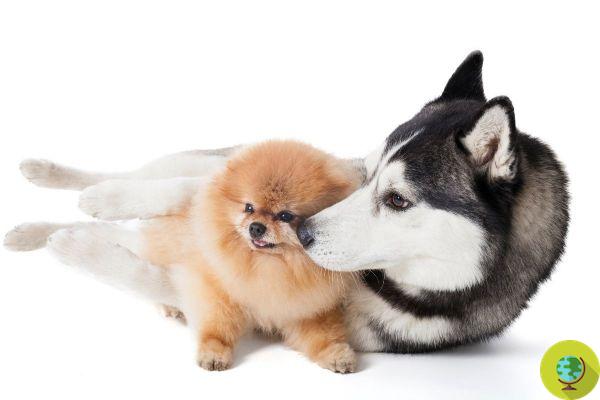
Bred wolf pups have remained wild and are afraid of strangers, but in dogs, communication skills emerge as a pup
He is about to end up run over, his mother saves himAccording to a recent study conducted by Duke University, wolf pups cannot be treated like other animals: you can love and cuddle them as much as you want, but they will naturally remain insensitive to the training practices that work with dogs.
Understanding of human gestures it seems an innate ability in all animals. It is actually a complex skill that is quite rare in the animal kingdom - think, for example, that even the animals closest to us, the chimpanzees, are unable to understand us. And, according to a study recently published by Duke University researchers, not even the closest dog-like animal: the wolf.
More than 14.000 years of coexistence with humans have instilled in dogs' brains a series of 'mental' skills that allow them to perceive what humans are thinking or feeling in a certain situation. These abilities, however, are not part of the innate baggage of wolves.
The study compared 44 dog and 37 wolf puppies (aged between 5 and 18 weeks), trying to support the idea that the domestication process undergone by dogs did not only change their appearance. and physical abilities, but also mental abilities. The wolf pups that took part in the study grew up in an environment rich in human interaction: they ate directly from the hands of the researchers and slept in their beds, receiving all kinds of attention from humans. On the contrary, puppies lived very independently from humans, with whom contact was minimized.
After a few weeks, the puppies were tested. In the first, the researchers placed two bowls in front of the puppy, one of which was hiding food: the humans tried to help the animals find what they were looking for with a gesture or glance in the direction of the bowl containing the food. The results were surprising: even without specific training, almost all the puppies immediately understood the meaning of the human gesture and moved in the right direction, while there was no such response from the wolf cubs - despite these. had spent a lot of time with humans. Even more impressive, many of the little dogs managed to find food on the first try.
It is not a question of understanding which of the two species is more 'intelligent' - he explains Hannah Salomons, author of the study. - Dog and wolf pups have demonstrated the same skills in other types of cognitive tests, such as those on memory or motor impulse control. Only when the abilities to 'read' human behavior were observed did the differences emerge. There are many forms of intelligence in the animal kingdom, and these adapt to their surroundings in order to ensure the best possible quality of life.
Fonte: Current Biology
We also recommend:
- Elephants chained and tortured to "learn" to bring tourists to Thailand, the unpublished images of the training
- Puppies have an innate ability to communicate with humans. I study
- Pet food: do you really know what's inside your dog or cat's food?


























